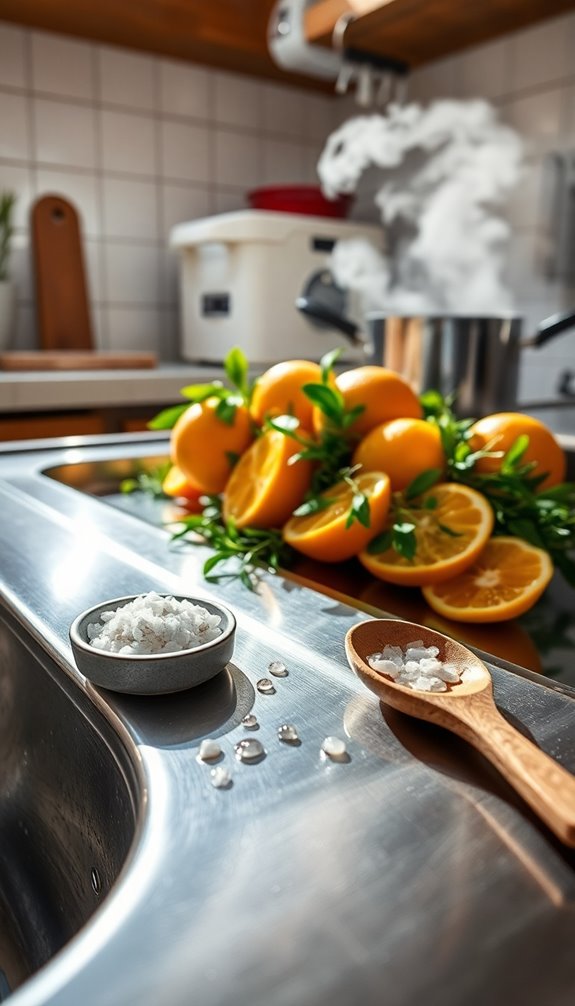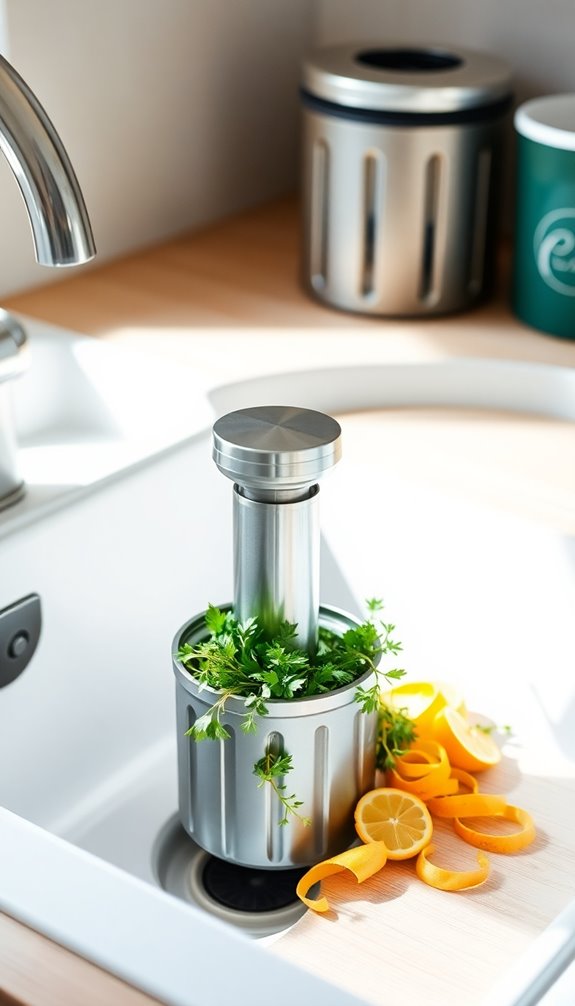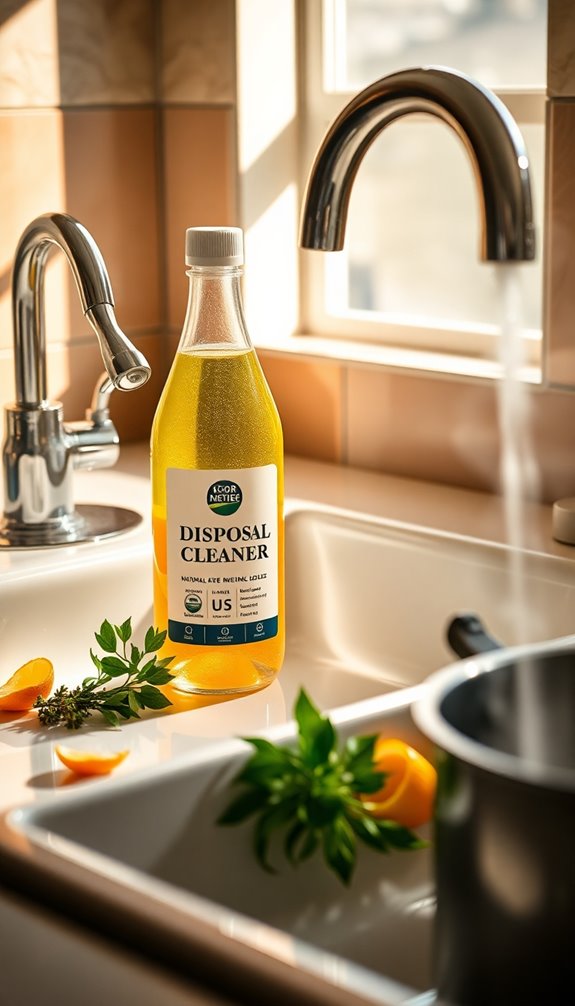To keep your kitchen sink smelling fresh, you need to clean your disposal regularly and avoid certain items. Start by grinding citrus peels to neutralize odors and break down grease. Mixing baking soda and vinegar works wonders as a natural deodorizer. Make ice cubes with salt to sharpen blades while cleaning, and pour boiling water down the drain occasionally to eliminate buildup. Always skip disposing of fibrous vegetables and fatty foods, as these worsen smells. Following these tips will guarantee your disposal stays fresh, and you might discover additional methods to keep your kitchen even cleaner.
Causes of Garbage Disposal Odors
Garbage disposal odors can stem from a mix of waste accumulation and improper items being tossed in. Over time, food particles can decay, leading to unpleasant garbage disposal smells that fill your kitchen. That initial sour aroma can quickly escalate into a pervasive kitchen odor if you don't address it promptly.
Grease and oil are significant contributors to these odors, as they can solidify and create clogs within your disposal system, trapping smelly food and waste. Regular cleaning of your kitchen surfaces can help prevent grease buildup, which in turn minimizes odors emanating from the disposal. Additionally, using natural degreasers is an effective way to maintain cleanliness and combat stubborn grease accumulation. Ensuring proper grease removal is crucial to preventing foul smells and maintaining a hygienic kitchen environment.
You mightn't realize that certain items, like meat scraps, fibrous vegetables, and eggshells, should be avoided in your disposal. These can exacerbate odor issues, making it difficult to keep your sink clean and fresh.
Regular maintenance is essential to eliminate odors. If clogs are left unresolved, they may require professional plumbing assistance to restore your disposal's functionality. Regular grease removal also aids in preventing costly plumbing issues and contributes to a cleaner, safer kitchen atmosphere.
Effective Cleaning Techniques
Maintaining a clean and odor-free kitchen sink requires effective cleaning techniques that tackle buildup and grime head-on.
Start by regularly cleaning your garbage disposals with a combination of ice cubes, baking soda, and vinegar. This method dislodges stubborn food scraps and neutralizes odors effectively. You can enhance this process by using ice cubes mixed with baking soda and lemon, which not only cleans but also leaves a revitalizing citrus scent. Additionally, regular cleaning of dish brushes and sponges prevents bacteria buildup that could contribute to unpleasant odors. Incorporating non-toxic cleaning solutions ensures a safe and effective approach to maintaining cleanliness in your kitchen.
Consider adding lemon peels to your disposal. They not only eliminate persistent odors but also bring antibacterial properties that keep your disposal fresh.
Additionally, pouring boiling water down the drain periodically helps dissolve grease and food residues, preventing clogs and maintaining a clean sink.
To keep odors at bay, implement a routine cleaning schedule—ideally once a month. This simple practice considerably reduces odor buildup and prolongs the lifespan of your garbage disposal. Regular cleaning will also help prevent grime and stains from accumulating in your sink area.
Natural Remedies for Freshness

Keep your kitchen sink smelling fresh by incorporating natural remedies that tackle odors and buildup. These methods not only help maintain a pleasant aroma but also improve your garbage disposal's efficiency.
1. Baking Soda and White Vinegar: Pour a cup of baking soda down the drain, followed by a cup of white vinegar. You'll see a bubbling reaction that neutralizes odor-causing bacteria. Additionally, this combination serves as an effective natural disinfectant to help keep your sink area safe from harmful germs. Using this method regularly can also reduce reliance on harsh chemicals, promoting a healthier kitchen environment.
After about 15 minutes, flush it with hot water to enhance the deodorizing effect.
2. Citrus Peels: Toss Citrus Peels, like those from lemons or oranges, into the disposal. They contain natural antibacterial properties and, when ground up, eliminate unpleasant smells. Plus, they leave a fresh scent behind!
3. Borax and Ice Cubes: For a weekly cleaning boost, sprinkle Borax down the drain. It breaks down buildup and odors effectively. To clean and sharpen the disposal blades, grind a mix of ice cubes and salt. This not only cleans the gunk but also promotes better functionality. Additionally, consider using eco-friendly cleaners to enhance your overall kitchen cleanliness and maintain a fresh environment.
Benefits of Using Citrus
Have you ever wondered how something as simple as citrus can elevate your kitchen sink's freshness? Citrus fruits like lemons, oranges, and limes are natural powerhouses when it comes to combating odors in your garbage disposal. Their antibacterial and antifungal properties help keep unpleasant smells at bay. When you grind citrus peels in the disposal, you release essential oils that not only neutralize odors but also leave a fresh scent behind. Additionally, using a diluted bleach solution can enhance your cleaning efforts, ensuring that germs are effectively eliminated.
The acidic nature of citrus plays a vital role in breaking down grease and food particles, enhancing the cleaning process. This helps reduce odor-causing buildup that can linger in your sink. Furthermore, you can even toss whole fruit slices into the disposal; just remember to add water while grinding to improve cleaning effectiveness and flush out debris. Incorporating citrus into your disposal cleaning routine regularly can markedly boost freshness and prolong your disposal system's lifespan.
Items to Avoid Disposing

Your garbage disposal might seem like a catch-all for kitchen scraps, but certain items can wreak havoc on its functionality. Disposing of the wrong food can lead to clogs, bad smells, and costly repairs. Here are three items you should definitely avoid:
- Oils and Fats: These can solidify in your pipes, causing significant clogs that are tough to clear. Regular inspections can help identify potential issues before they escalate, and preventing grease buildup is essential to maintaining a functional kitchen.
- Meats: Whether raw or cooked, they can contribute to odor buildup and blockages that make your disposal smell foul.
- Stringy Vegetables: Foods like celery and onion can wrap around the disposal blades, leading to operational issues and potential damage.
Additionally, don't let eggshells or coffee grounds fool you—they may seem harmless but can lead to buildup and sludge. Regular maintenance of your disposal is crucial for preventing costly plumbing issues and keeping your kitchen smelling fresh.
Care and Maintenance Tips
To maintain a smoothly running garbage disposal, regular care and maintenance are vital. Start by cleaning your disposal at least once a month to prevent unpleasant smells and the buildup of food residue. You can use baking soda and vinegar for a natural cleanse; just pour them down the drain, let them fizz, then flush with cold water.
When using the disposal, always run cold water. This helps to grind down food waste effectively and flush away debris. Remember to keep the water running for an additional 10 seconds after grinding to guarantee everything is washed down properly.
Avoid overloading the disposal by feeding food waste gradually. This practice minimizes the risk of clogs and helps maintain peak functionality.
It's also important to educate everyone in your household about what should and shouldn't go down the disposal. Keep oils, fats, and fibrous vegetables out to avoid issues.
Lastly, regularly inspect for slow drainage. If you notice this, it can indicate potential clogs that need addressing promptly to keep your sink smelling fresh.
Following these care tips will help you enjoy a cleaner and more efficient disposal.
Professional Help and Recommendations

If you're dealing with stubborn odors or clogs that just won't budge, it's time to call in a professional plumber.
They can use specialized cleaning techniques and products tailored to your disposal model, ensuring a thorough job.
Plus, they'll offer preventive maintenance tips to keep your sink running smoothly in the long run.
When to Seek Help
Knowing when to seek professional help for your kitchen sink disposal can save you time and frustration.
If you're facing persistent odors or slow drainage, it might be time to call in a professional plumber.
Here are three key signs that indicate you should seek help:
- Persistent Odors: If stubborn odors linger despite your best cleaning efforts, it could signal deeper clogs or plumbing problems that require expertise to resolve.
- Slow Drainage: Notice your sink draining more slowly than usual? This could indicate an underlying blockage that, if left untreated, might lead to more significant issues.
- Foul Smells After Maintenance: If your garbage disposal emits a foul smell even after routine maintenance, it's wise to consult a professional.
They can assess the situation and potentially uncover hidden problems.
Professional Cleaning Techniques
When it comes to keeping your garbage disposal in top shape, professional cleaning techniques can make a significant difference. Hiring a professional plumber allows you to effectively assess and deodorize persistent odors, often using enzyme-based cleaners that target odor-causing bacteria.
These experts have advanced tools and the know-how to remove stubborn blockages, providing a thorough cleaning that DIY methods might miss.
Regular professional maintenance can prolong the lifespan of your garbage disposal and guarantee it operates at peak performance. By addressing issues before they escalate, you can avoid costly repairs down the line.
Many plumbing services recommend scheduling a professional cleaning at least once a year. This routine maintenance helps maintain freshness and prevents buildup that leads to unpleasant smells.
Consulting with professionals also gives you valuable insight into proper disposal practices and preventative measures. They can guide you on what to avoid putting down your disposal, helping minimize future odor and clogging issues.
With these professional cleaning techniques, you'll keep your kitchen sink smelling fresh and functioning efficiently, giving you peace of mind in your daily routine.
Preventive Maintenance Advice
Regular preventive maintenance is key to keeping your garbage disposal running smoothly and odor-free. By taking proactive steps, you can prevent issues like draining slowly and unpleasant smells.
Here are three recommendations to help you maintain your disposal effectively:
- Schedule Professional Plumbing Maintenance: Aim for at least once a year to guarantee your disposal functions at its best. Professionals can identify potential clogs and odor sources before they become major problems.
- Use Enzyme-Based Cleaners: These cleaners help break down organic waste and eliminate bacteria that cause odors. Consider incorporating commercially available disposal cleaners with D-Limonene for added freshness between professional cleanings.
- Educate Your Household: Make sure everyone knows what should and shouldn't go down the disposal. Avoid putting grease, fibrous vegetables, and large food scraps in there to keep your kitchen clean and smelling fresh.
Additionally, implementing a monthly routine with natural remedies like baking soda and vinegar can greatly reduce food residue buildup.
With these preventive measures, you'll maintain a fresh-smelling kitchen and prolong the life of your garbage disposal!
Conclusion
So, while you might think a garbage disposal's purpose is to swallow all your kitchen scraps, it actually thrives on a little TLC to keep those odors at bay. By following these cleaning tips and using natural remedies, you can turn your stinky sink into a fragrant haven. Ironically, the very thing designed to dispose of waste needs your attention to stay fresh—who knew a trash-eater could require such delicate care? Your nose will thank you!